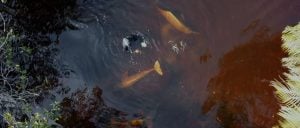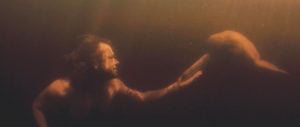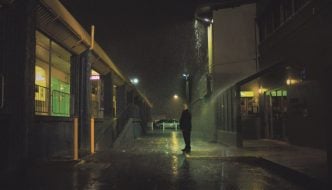
What led you to make the film?
I had just finished the last one that I made and I was still living in Colombia so the producer of the film Torus Tammer approached me as he had become very close friends with Fernando Trujillo the Colombian biologist and he says ‘look I’ve got this great story, I’ve got this guy whose out there trying to save the dolphins’ and he explained this whole controversy to me and I said ‘I cant make a ‘Save the Dolphins’, film I don’t want to do that’ but he said ‘look into it’ so i started digging around and that lead me to really look at it in a way that was a lot more complex and I realise that there’s this whole other story in Brazil and this video which was already broadcast in Brazil when I started making the film and it lead to the moratorium on their fish, the protection of the dolphins and my first feeling when i saw it was ‘how in the hell did they get somebody to do this on camera, to kill this dolphin? And who did it?’ It was just amazing to me that no one asked those questions. So we started asking questions and that’s how it started.
I was really intrigued as you have this issue at the heart of the film and then this complex story around it I was intrigued which came first, it sounds like it’’s the story that’s the fire behind it that drove it is that right?
Well the biggest lesson I learned from my first film is not to listen to the story that’s screaming at you, listen to the people that are whispering off camera and that’s almost literally what happened here. I’m telling this story about dolphins being killed, about policy, about government inaction, about big business, but I didn’t interview any of those people. I wanted to talk to the fishermen, talk to the people at ground level and so that was one of the first things I did in Brazil and I didn’t ask about the video but they would say to me ‘turn the camera off and let’s go talk in that dark corner’ and they would say ‘you need to look into this video something is suspicious about it’. The story of the dolphins lead me into it but searching for complexity was the drive.
You’ve said yourself you get the shadowy off camera requests, were you ever scared making the film that you were asking the wrong questions or potentially antagonizing the wrong people?
In a place like the Amazon, a lot of stuff can happen without anybody knowing but I don’t want to paint the picture that this was a really dangerous film to make because it wasn’t. What was really dangerous was more what the people in the film offered up to me, they put themselves in danger and so to me that’s less than a sense of danger than of a huge sense of responsibility towards them and the danger they were putting themselves in. They were admitting to me that they had essentially committed a federal crime but there was so much more to this story and that’s why there were coming out with it. I never really felt endangered but I don’t know if that was just me being naive.
The film features quite a prominent character in Richard Rasmussen, what was it like working with him?
It was amazing! For anyone making a documentary you’re just hoping for a character like Richard, and I don’t mean just because what he did was controversial, he’s just incredible on camera. He’s just a natural, he’s a personality, he’s charming, he’s charismatic, he knows how to entice you on camera and there’s very little you have to do except just be ready and point the camera, and follow him and guide him in the right way. The real gift about Richard is that he’s complex that’s the real amazing gift as a filmmaker to find somebody like him. Now the other side of that coin is that it’s really hard to objectively portray him in the film. I tried to, because there’s all this controversy and complexity, run that razor’s edge and give him a fair portrayal in the film, even if what he’s doing is controversial.

What did Richard think of the film?
We showed it to him a couple of weeks ago. After Tribeca there were Brazilian journalists who wrote this story about the film where it was misinterpreted by the press in Brazil that I had accused him of killing a dolphin. Of course I never say that in the film and the film doesn’t say that either, it just raises the question.
The irony of all that is that this film is all about what does it really take to get a story, including for myself as the filmmaker, and sometimes the easiest story to tell is the superficial one or a salacious one and the irony of the Brazilian press was that they were telling this salacious story and they had not even seen the film so Richard had received a lot of bad press. He was outside the country and as soon as he got back we showed him the film and he was very nervous about watching it because he had heard all of this stuff but once he saw it he said to me “those are my words and I think you did a fair job, I know it’s controversial but I stand behind my actions.” I think he was happy with it.
We’re a nation of nature documentary watchers and have always been told about how difficult it is to get footage like the incredible footage of the dolphins that features in your film, how hard was that footage to get?
These dolphins are like unicorns, like a mystical thing you can’t even believe exists. There’s a pink dolphin in the amazon how much more bizarre can that world be to people like us? Part of the film is me travelling with Fernando through the Peruvian Amazon, the Colombian Amazon, the Brazilian Amazon, down the river and he’s saying to me “I’ve spent 30 years doing this and I used to see tonnes of them all the time and now I can go days and days without seeing anything,” but the amazing thing is that the place you are guaranteed to see dolphins is near human populations. People are fishing and it’s easy food so the dolphins can become habituated to humans in certain parts. They are also very curious animals so you could just jump in the water and then all of a sudden you’d have ten of them around you. It’s almost like a group of dogs, yeah there’s someone there giving them some fish but then they also want to play, they are really bright and curious and so that wasn’t actually that difficult.
The footage in the video itself of them killing the dolphin now that’s something that’s incredibly tough to shoot and that’s the point, how did they get that? First of all it’s very tough to kill a dolphin but also its a federal crime. This is one of the big questions of the film I hope that the audiences are feeling that you can’t really trust what you see. If you start to step back from the frame of this kind of footage, what really goes on? What’s happening behind the camera to make something like that possible? and often times it can be very troubling to find out how an image is captured and what people have to do. Then the even larger question I hope you get after finding that is why is it that we only react when we are shown the bloody image? Why is it that these scientists and researchers have been out there for decades screaming that this is going on and no one pays attention? So then you have somebody who is fluent in the media, a media personality and a reality TV star and he says “I know how you can get people to move” and he’s right and so it’s not fair to judge Richard, we should be judging ourselves
It’s a film that really highlights the complexity of the issue at it’s heart. Richard has embarked on this journey to protect this species but its not casualty free, so that must have been difficult to meet those affected people and see that there’s not a clear answer. Do you think that there is hope for these fisherman who have lost an economy, is there a way forward for them?
It wasn’t shocking to me to find out that the people who would be affected the most by this policy would be the poor. It’s so predictable and this is the case that happens everywhere that these measures are taken without a holistic approach and typically the ones who stand outside of that ‘solution’ are the poor and they pay the largest price. This film is also about questioning the conservation movement, what are we doing? Who’s out there fighting in our name? In these dire circumstances what approach are they going to take to try to change something quickly? Which is necessary as its got to change fast, but those that pay the price are typically the ones that are underrepresented so it was not shocking to me to find out but like I said before it was a huge responsibility once we did find them to give them a chance to tell their story.
It was really illuminating to see the conservationist, Richard, meeting the people who were in one way a victim of conservationism and trying to mitigate those responsibilities. One is Richard’s goal to save the animal and he’s having to realise that there’s a human price to pay for that action. Then the people in the town are saying ‘all we want to do is to be able to survive and you’re pulling the rug out from underneath us, we don’t care about the dolphin we’re just trying to eat everyday’ and it ends with a selfie together, all of that ends in a selfie which is really incredible but it’s incredible that we’re so media obsessed. Even the people out in the middle of the Amazon who have no electricity but they have these parabolic satellites that’s how Richard was able to do this, they knew who he was.
There’s a part of the film where it discusses the power of the media and with that in mind what did you envision your film could achieve in terms of moving things forwards?
Like I said in the beginning, I didn’t want to make a ‘Save the Dolphins’ film but at the same time I didn’t want to undermine that advocacy. There’s no denying right now that there is a mass extinction going on of animal species, much of it caused by human activity and the dolphin is a reflection of that but what I’m trying to ask here is what are the best approaches? This is just an isolated situation but i think it speaks to a lot of similar situations that are going on in the rest of the world. Who are the people out there fighting to make real change and what do they have to do to get it? So one of our characters does something that’s extremely effective and it’s literally an overnight change and that short term change which comes with a price because it’s not looking at the bigger picture. So then we have another character that’s ineffective that’s been collecting data for decades and screaming from the mountaintops ‘’listen to me look at my research’ and no one will listen. In fact, the only people listening to him are threatening his life, and all he’s saying is that we have to take a holistic approach. If we have systematic destructions we need systemic repair, how else are you going to undo this?
It’s quite a unique conservationist film in as far as it doesn’t seem to resemble propaganda as is often the case in the genre. Would you say it’s fair to say that the film aims to encourage conservationists to question themselves and what their doing in their quest for their end game?
It’s just my opinion but the films that often centre around these kind of issues typically preach to the choir and offer up solutions. Why are filmmakers offering up solutions? We’re here to tell stories and I think that they should be emotive and they should grab you and that they should engage you and pull you out of your normal world. If you go to a film about the dolphins and the dolphins are being killed and there’s someone out there fighting for them and doing a bang up job and he’s getting things done and he’s just a wonderful human being well then you’re just going to walk out of there and think ‘great he/she is taking taking care of it, I can just go home’. I want audiences to walk out of this film and think ‘oh my God, look at the mess we’ve created, how am I a part of that?’ and I think in a large way that this film is so much about the plight of the dolphins and the people out there trying to save them but then it’s also a media study and about our role in that and my role as a filmmaker and as a storyteller. What do I have to do to get a story? That’s why there’s these moments when I’m in the film because I’m playing the same game. I feel like a documentary should take you someplace you may not have known you can go before.
The first 10-15 minutes of the film gets you in that safe space that this about the ‘Save the Dolphins’ movement and as we talk about the dolphins as bait for fish I’m trying to bait you as an audience into a false sense of security. So the audience believes they know where the film is going but then it turns on its head. There’s not that many films out there I think that question conservationism, these people seem like heroes to most people. Maybe they make the films themselves or the people making the films about them are just like them. I don’t think that I am undermining the advocacy but I am questioning whats going on to try to save the dolphins, and so in that way I think we can have a better conversation about the best way to do it it instead of just saying ‘go out and save in my name.’
Filed under: Film, TV & Tech
Tagged with: A River Below, Documentary Festival, Fernando Trujillo, Mark Grieco, Richard Rasmussen, Sheffield Doc Fest

Comments